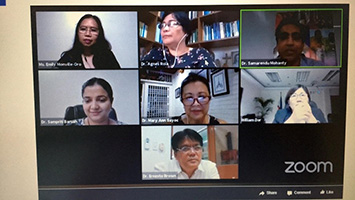 To recognize the growing importance of women’s contribution in Philippine agriculture, an international webinar on the women’s role in developing seed systems was recently conducted.
To recognize the growing importance of women’s contribution in Philippine agriculture, an international webinar on the women’s role in developing seed systems was recently conducted.
The webinar, “Role of Women in Developing a Climate Smart Seed System in the Philippines,” was co-organized by the International Potato Center (CIP), the Philippine Council for Agriculture, Aquatic and Natural Resources Research and Development of the Department of Science and Technology (DOST-PCAARRD), and the CGIAR Research Program on Climate Change, Agriculture, and Food Security (CCAFS).
Dr. Ernesto O. Brown, Director of the Socio-Economics Research Division (SERD) represented DOST-PCAARRD in the webinar by presenting an overview of the Philippine seed system and the crucial roles that women fulfill in the entire seed value chain.
Moreover, Dr. Brown highlighted the various R&D initiatives of the Council wherein women contribute actively as community leaders and beneficiaries. He also discussed the need to examine the roles of women to achieve a climate-smart seed system and underscored that gender inequality is tied to food insecurity. Finally, he presented a multitude of R&D and policy recommendations that could be carried by public and private institutions to accentuate women’s roles in the development of a climate-smart seed system in the Philippines.
Dr. William D. Dar, Secretary of the Department of Agriculture, keynoted the webinar and presented the ongoing efforts of the current administration. Other panelists of the webinar were: DA-Agricultural Training Institute (ATI) Deputy Director Rosana Mula; Ms. Emily Oro of International Institute of Rural Reconstruction, and Dr. Mary Ann Sayoc of the Philippine Seed Industry Association (PSIA).
At the latter portion of the program, CIP Director for Asia Samarendu Mohanty moderated an open forum, wherein participants were allowed to ask questions to panelists. The webinar concluded with the organizers’ call to enjoin everyone in developing a policy environment in the Philippines where gender equality drives transformation towards equitable, sustainable, productive, and climate resilient seed systems.
